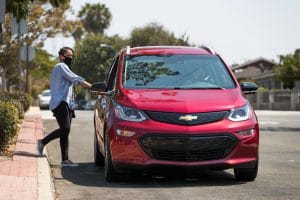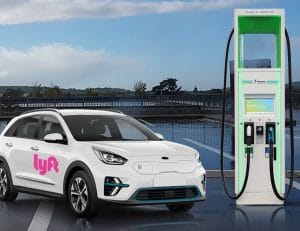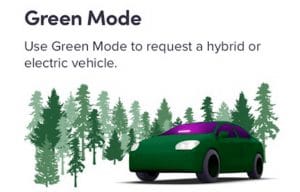
GM and Uber team up to reduce vehicle emissions and accelerate the transition to an all-electric future.
General Motors is expanding a program intended to help ride-hailing drivers go electric as part of market giant Uber’s goal to have 100% of its U.S. vehicles running on battery power by 2030.
The automaker will let drivers access employee pricing if they purchase a new Chevrolet Bolt EV, it said Tuesday, with additional, 20% discounts on Bolt accessories, such as home chargers.
“Uber has a clear responsibility to reduce our environmental impact,” Uber CEO Dara Khosrowshahi told reporters on Tuesday.
(GM pulls the plug on Maven car-sharing service.)
The ride-hailing service’s primary competitor, Lyft, announced a similar target in June.

Uber CEO Dara Khosrowshahi said he believes the company has a responsibility to lessen its impact on the environment.
While the companies may want to go entirely electric, it’s not going to be as easy as it sounds since neither Uber nor Lyft actually own the vehicles they use. Instead, they rely on private vehicle owners – itself an issue that has created headaches – especially recently – for the two companies.
Getting ride-haling services to go electric would have a significant impact on the environment, according to a study done by the Union of Concerned Scientists. It found that vehicles used for ride-hailing produce significantly more carbon dioxide emissions than comparable, privately owned vehicles and, on average, generated 69% more greenhouse gas emissions on a similar trip. That’s primarily due to all the time ride-hailing drivers spend roaming around in-between trips.
The challenge is convincing the drivers to make the switch. There are some significant obstacles, starting with the price of the battery-electric vehicles now available. Even with the $7,500 federal tax incentives available on some products, BEVs generally carry premiums that can run $5,000 or more above comparable gas models.
Range remains another issue. Though Tesla recently launched a 402-mile version of its high-

Lyft is looking to move to an all-electric fleet by 2030, joining Uber in making the same commitment.
line Model S, most of the new “long-range” battery cars average between 200 to 250 miles per charge – under optimal conditions. Those numbers routinely dip by 40% or more in Snowbelt regions when the temperature dips below 20 degrees Fahrenheit, according to studies run by AAA and confirmed by TheDetroitBureau.com’s own experience with late-model BEVs.
(Uber, Lyft get last-minute reprieve ahead of California shutdown.)
Charging is another challenge. On the plus side, many potential drivers could plug in at home and, especially at night, take advantage of discounted energy rates. But charging during work hours could take a vehicle off the road for some time, even with the latest fast chargers. And prices run substantially higher at public stations.
Uber is stepping in to help make the switch more attractive. The discount program being launched with GM could save as much as $2,750 on a Bolt.
“Improving access to EVs for on-demand service providers can help reduce overall tailpipe emissions in cities across the country and help accelerate widespread EV adoption,” said Sigal Cordeiro, GM executive director of Sales and Marketing for Global Innovation. “Our collaboration with Uber will facilitate drivers’ switch to an EV, empowering these drivers, their passengers and communities to experience electric vehicles and contribute to cleaner air in our cities.”

Lyft now offers riders the option of selecting and EV or hybrid for their ride in Seattle and Portland.
For its part, GM has several reasons to work with Uber. While the Bolt was the fourth best-selling EV in the U.S. during the first half of the year it lagged well behind the three most popular battery cars, all from Tesla, barely beating out the California company’s fourth offering, the Model X SUV.
Not only will the discount generate sales to Uber drivers but it could boost demand among potential customers who get to experience the Bolt for themselves, creating “new ways for drivers and customers across the country to fall in love with driving electric,” said Steve Majoros, vice president of Chevrolet Marketing.
(Uber, Lyft hit by decision declaring drivers are employees.)
Other automakers also plan to offer discounts. The major charging service EVgo, meanwhile, will give Uber drivers discounts ranging from 10 to 25%.
